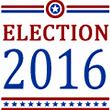A professional journalist should never expresses a political view so that he/she may remain fair, complete and accurate in reporting events. I am now retired, which permits me to comment on the 2016 presidential race.
I soon discovered, however, that the task of picking a favorite candidate is a formidable and an imprecise undertaking.
First, I established ground rules for choosing a candidate:
 1. The person must be qualified to serve as the commander-in-chief.
1. The person must be qualified to serve as the commander-in-chief.
2. The person must be able and willing to work with Congress.
3. The person must be trustworthy.
I qualified as an astute political expert by listening to speeches of candidates on C-Span and to most of the presidential debates, which really weren’t debates in the classical sense but often were “gotcha” sessions often conducted by television political commentators.
We didn’t hear from all of the candidates on both sides of the aisle during the so-called debates or in any other forum. They were classified as third-tier wannabes or were ignored completely.
Eventually, the Republicans winnowed the list to less than a dozen and the Democrats to three prior to the first primary election in Iowa. When the dust settled there, only two Democratic candidates survived.
On the Republican side, former governors John Kasich, Chris Christie and Jeb Bush attempted to convince voters that they are not part of the “establishment” and can right the ship of state if called on to serve as the party’s nominee. However, Christie failed to create a viable following and threw in the towel after New Hampshire.
Ted Cruz may be liked by evangelical conservatives but reportedly not by his associates in the Senate. Fellow Senator Marco Rubio blows hot and cold while jockeying for a shot at the Republican nomination.
Meanwhile, Donald Trump, a masterful media manipulator, leads the charge by promoting his reputation as a “deal maker,” which apparently is a clarion call answered by folks who want “to make America great again,” whatever that means. He obviously “strikes out” based on the ground rules that I established in selecting a presidential candidate.
Somewhere in the melee, Republicans Ben Carson and Carly Fiorina and Democrat Martin O’Malley became lost and largely forgotten.
On the Democratic side, Bernie Sanders leads what he calls a “political revolution,” one that is especially popular with young voters and idealists. The question, of course, is whether he could gain congressional approval of his plan to “take from the rich” to finance much of his socialist agenda.
Hilary Clinton, the most experienced candidate who has encountered more opposition than anticipated, lost the trust and support of many voters by exercising poor judgment in continuing her association with the Clinton Foundation and by using a private e-mail server while secretary of state.
I am particularly miffed because we permit states like Ohio and New Hampshire to winnow the list of presidential candidates before I get a crack at it. By the time that we vote in Oregon, two of my favorite presidential candidates won’t be on the ballot.
In the best of all worlds, every state would conduct the primary election on the same day and would follow Oregon’s practice of mailing ballots a couple of weeks early, thus eliminating the need to wait in line or to haggle over voting qualifications.
Granted, this practice would greatly diminish the need to spend millions of dollars on an exhausting, repetitive campaign trail but might spell bankruptcy for electronic media because of the loss of advertising revenue.
Meanwhile, pick your favorite candidate — if any remain standing — but pay no attention to a neophyte political prognosticator like me, a person who is more at home in a newsroom than in a political arena.

So, given who’s left in the running, which candidate would you vote for if the election were held today?
LikeLike